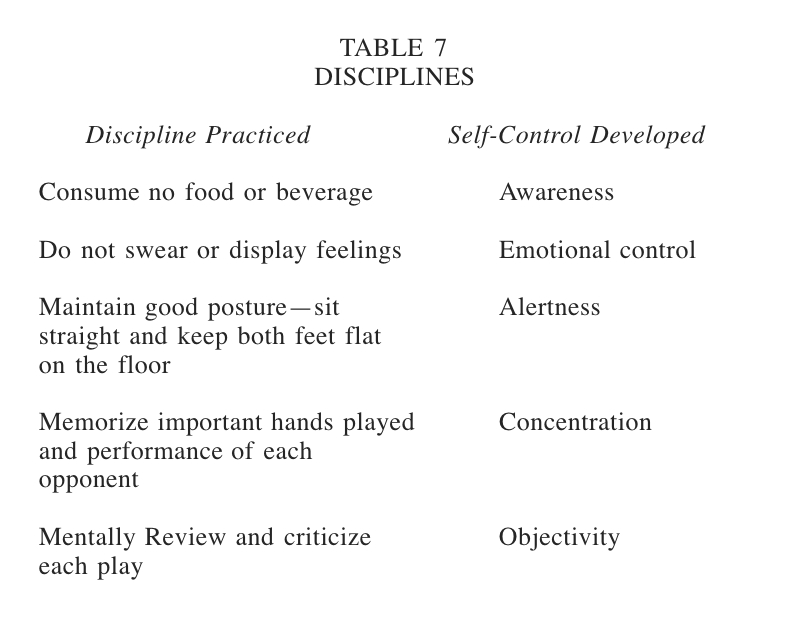Discipline

The good player increases his advantage as the game grinds into late hours. His disciplines become more nagging and thus more effective for maintaining self-control. At the same time, the concentration and playing ability of his tired opponents decrease. Also as his opponents develop into big winners or big losers for the evening, they become less objective and respond more to their feelings.
A decrease in discipline has a cumulative effect that can cause even a sound player to deteriorate into a poor player. For example, if a loss in discipline generates a breakdown in self- control, then a process of deterioration starts. Deterioration may be only temporary . . . but it can be permanent, especially with compulsive gamblers.
Deterioration can start spontaneously or can be induced by—
- a long losing or winning streak
- entering a higher-stake or a lower-stake game
- a close loss of a big hand
- a bad play or bet
- an upsetting remark
- boredom or weariness
- a personal problem
The good player recognizes any loss of discipline during the game. He adopts the following attitudes to prevent deterioration of his own discipline and play:
– Actual winning or losing of a pot is not important.
– Each well-played hand, won or lost, is a victory.
– Each poorly played hand is a defeat (even if the pot is won).
– Each move or action lacking discipline can eventually cost much more money than there is in any pot.
Consistent, tight discipline can build momentum toward a continuous string of flawless plays. If a bad play spoils this momentum, the resulting loss of self-control can lead to poorer- quality poker. A bad play to a good poker player can be as a cigarette is to an ex-smoker . . . one slip (betrayal of one’s self) breaks the momentum of discipline and can bring disaster.12
A few minutes of postgame discipline are necessary to record valuable information and data about the game. In addition to his notes written after each game, the good player periodically reevaluates the game and its players. These evaluations point out slow changes occurring in the game and often suggest changes in strategy necessary to maintain optimum edge odds.
John Finn uses convenient photocopied outlines, as shown in Tables 8, 10, and 12, and periodically fills them out as shown in Tables 9,11, and 13. Those outlines provide him with consistent up-to-date information on the game and its players.
A few minutes of pregame discipline is needed to review past notes. Also, a nap before the game improves discipline and thought. A bath and a shave help restore the freshness necessary to sustain peak performance throughout an all-night session.
_______________________
12 The good player does not consider an honest error in judgment a flaw. To him a flaw is the failure to think and act rationally. The flawless play, therefore, is not based on omniscience or perfect judgment, but rather on full rational thought.